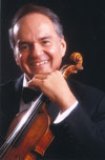
Linton's "Four Hands" a Crowd Pleaser


Encore! Linton’s “Four Hands are Better Than Two” connected beautifully at Congregation Beth Adam in Loveland Monday evening (a repeat of the opening concert Sunday afternoon at First Unitarian Church in Avondale).
The four hands were those of pianists Anna Polonsky and Orion Weiss, husband and wife, who presented an engaging program of music for piano four-hands, including Schubert’s Fantasy in F Minor, D. 940, and Dvořák’s Slavonic Dances, Op. 46.
Also on the program was music for another set of four hands, those of violinist Jaime Laredo and cellist Sharon Robinson -- co-artistic directors of Linton and also husband and wife -- who joined forces in Norwegian composer Johann Halvorsen’s Passacaglia after Handel. Each also performed a duo with one of the two pianists. Robinson performed Robert Schumann’s “Fantasy Pieces” for Cello and Piano, Op. 73, with Weiss on piano. Laredo performed Stravinsky’s “Suite Italienne” with Polonsky at the keyboard.


Laredo and Robinson opened with Halvorsen’s Passacaglia, whose virtuoso licks, whether negotiating rapid passage work, tricky bowings or vaulting into the stratosphere, were well served by the duo. Robinson returned for Schumann’s “Fantasy Pieces” with Weiss. The set of three character pieces was well delineated by the players. The first, marked “Zart und mit Ausdruck” (“Tender and with expression”) was extremely touching, the second, “Lebhaft, leicht” (“Lively, light”), genial and composed. Robinson conjured a big, heroic sound in “Rasch und mit Feuer” (“Quick and with fire”), bringing the set to a close.
The first of the four-hand works, Schubert’s Fantasy in F Minor, was written during the last year of the composer’s tragically short life. Polonsky and Weiss played like one pianist throughout. Their communication was close and visible, often accompanied by smiles and sideways glances. Their expressivity on the keyboard was fully complementary as a result. There was intense feeling in the first two movements (the work is played without pause), a moment of jollity in the third movement and an imposing finale, with a dramatic transition, a fugue and the return of earlier material before coming to its gentle conclusion.
Stravinsky’s “Suite Italienne” for violin and piano is drawn from his “Pulcinella” ballet, which marked the composer’s shift to neo-classicism. It is a thoroughly charming work, and Laredo and Polonsky gave it a performance to match, from the proud, march-like Introduction to the rapid, percussive conclusion. Polonsky showed herself very nimble on the keys, as did Laredo on his fiddle, and both poured sentiment into the tender Serenata movement.
The concert ended with dancing – on the keys, that is, as Polonsky and Weiss returned to delight their listeners with Dvořák’s Slavonic Dances, Op. 46 (originally written for piano four-hands and later orchestrated to become symphonic favorites). The players switched places here, with Weiss playing the top half of the piano and Polonsky the bottom (the reverse of the Schubert Fantasy).
The familiar music came vividly to life in their hands, from furiant to furiant (the energetic Bohemian folk dances that frame the set). No. 2 in E Minor, a dumka, was edged with feeling, and there was a moving, almost nostalgic cast to No. 4 in F Major, a waltz-like sousedská with a perky, contrasting mid-section. The two pianists brought the crowd to its feet at the conclusion of the final, pounding, furiant in a hail of well-pleased bravi.